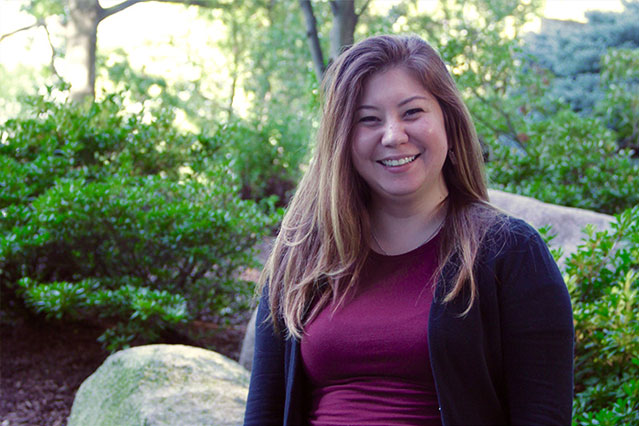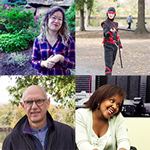Faces Behind the Screen: Alicia
Quick Links
<< Return to all “Faces Behind the Screen” stories
We met Alicia at BU during the first interview session of our Faces Behind the Screen project at Boston University.
Alicia is a Deaf Ph.D. student studying Biomedical Sciences — specifically Molecular and Translational Medicine — with a background in Immunology. She’s currently studying bacterial pneumonia and what parts of the bacteria could be causing different immune responses in humans (i.e. why some people have more severe reactions, and why others recover faster).
Below is a video from our interview with Alicia in which she signed her responses. The text in this story is transcribed from her interpreter’s voice:
So, what do you want to do when you graduate?
Everyone asks me that, but I’m still kind of playing around with it.
I think right now I really want to become a teacher. I want to help with setting the foundation for undergraduates to make sure that they have the potential to really have thoughtful analysis skills and be able to come up with ideas that they’re supposed to — really, to get a Ph.D.
…I’m also really interested in science communication. So, science policy, and how do we take information about what’s happening in the lab on paper to the general community, and how do we help them understand what’s happening?
“…Sometimes my meaning and another person’s meaning can be different, and it can be lost in translation.”
What is it like being translated by an interpreter?
I think there are pros and cons to it. A pro is that it’s really nice to have my voice there instead of being without an interpreter or without captions. I wouldn’t have any voice out there.
So, with an interpreter, or whatever translation [service] is there, I think it’s perfect. But some negatives are that it’s not me who’s speaking. You know? And sometimes my meaning and another person’s meaning can be different, and it can be lost in translation.
“…They said, you can’t be friends with us anymore because we don’t know who you are.”
Do you ever experience situations with hearing people who aren’t willing to be patient or reciprocate in conversation?
Who I talk with and who I’m comfortable with kind of ranges on how much the hearing person wants to communicate with me. So, if the person doesn’t have any patience or isn’t really interested in chatting with me, I can’t really have an interaction openly. I can’t open up.
…I think I started to realize it when I was in middle school. I was in a group of friends, probably five or six of us, and it was during lunch. They all decided that they didn’t want to be friends anymore because I never talked. Because I was a quiet person. And you know, they said, you can’t be friends with us anymore because we don’t know who you are.
Did you feel like communication with other people improved once you got to college?
I grew up speaking. I didn’t know sign language and I had no interpreters. I only hung out with hearing people.
And then I was around 16, and I happened to meet some Deaf people that were my age, and I started learning sign language. And then I went to RIT (Rochester Institute of Technology), where they have a really big Deaf community. And they had interpreters available, and hearing people who knew some sign language, so I felt like all of that access was just great. It was perfect because now I can know what’s going on. And I know what they’re saying. I had full access and I felt like I could really take advantage of that full potential.
You mentioned you love musical theatre, especially the ASL interpretation you found on YouTube of the song “Alexander Hamiltom” from the musical Hamilton…
I just fell in love with it.
I really liked how she interpreted it, I liked the sound of it. So, now I’m listening to the rest of the album.
How was your experience with Vine, the video-sharing app, which didn’t enable feature?
“I would have to bring in an interpreter or find a video that’s already closed captioned to know what was going on.”
I never knew what they were saying.
So, people in school would be talking like, “oh my god, I watched the video this weekend, it was really funny, go ahead and watch it.” And I couldn’t. I would have to bring in an interpreter or find a video that’s already closed captioned to know what was going on.
You mentioned you went travelling to England, Scotland, and Ireland. What was that like in terms of communication?
It was really a cool experience. Their accent was really hard for me to understand. But everyone was really friendly. Because, I would show them my phone and ask a question like: Where do I go? How do I get there? Or, if I went to a museum, I would type in: What does this mean? And why are those pillars collapsed? Or whatever it was. So, people were really good about interacting with me. I had a really positive experience with that.
I’ve never really faced a big [language] barrier. Especially in England, and Scotland, and Ireland. Because I think they’re so used to people who are travelers and who come there speaking different languages. They’re very communicative.
What would you say is the best thing about being Deaf? And what is the worst thing about being Deaf?
“I’m a scuba diver, actually, and my best friend is too, and it’s really nice that we can communicate with each other underwater.”
The best thing is the community.
I love the Deaf community. Everything is so, so tightly knit with each other. And a lot of my best friends are from the Deaf community. And our way of communicating things– we just have access. I’m a scuba diver, actually, and my best friend is too, and it’s really nice that we can communicate with each other underwater.
The worst thing is making new friends with hearing people in the hearing community. I do feel like without knowing what’s going on in the environment, I really can’t be myself. And I can’t be my nerdy, quirky self, where I can make sarcastic jokes, because I don’t know what’s going on around me. So, if I finally understand what’s going on, it’s too late. And then if I shout something out, I get weird stares, and some “um”s and “OK”s. So, that communication piece is really hard because I don’t get the chance to really hear the stories from the other people, the hearing people around me, and learn about them.
“…Don’t be shy. We want to talk with you.”
What is something that you think hearing people should be more aware of when it comes to the Deaf community?
Patience. [That] you have patience to interact with the person. And don’t be shy. We want to talk with you. Sometimes, it might seem like we don’t want to talk with you, but we always do. Sometimes, we don’t know how to make the first move. So, patience is really important. If we don’t understand you or things are taking longer, your patience will be really critical to help us open up.
—
NOTE: This page was originally published on 1/24/2017 and was updated 1/12/2018.
We want to extend a huge thank you to Boston University and the Howard Thurman Center for Common Ground for hosting this series of interviews.
Faces Behind the Screen is a storytelling project focusing on members of the Deaf and hard of hearing community.





